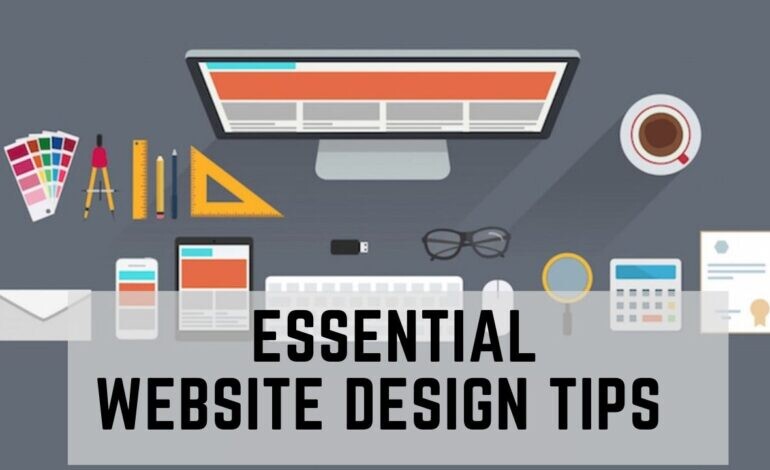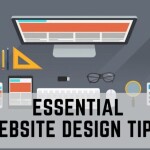In today’s digital-first world, a website is a crucial component of every brand’s identity. Users will initially visit the website to learn more about any brand or business. In this case, it becomes crucial to develop your website in accordance with web design best practices to prevent any errors. A smooth user experience is the result of using the right website design ideas and practices. Therefore, planning and developing a website with relevant sections using the greatest website design advice and techniques is the foundation of any successful branding.
Here’s a gathered list of significant web design ideas and suggestions to assist designers and marketers in optimising the performance of their websites. Please continue reading to learn how to create an efficient website layout: –
Layout

Put this one at the top of your list of priorities. It is the secret to any popular website’s success and high traffic. Prior to developing additional basics like designing, extensions, and shareable buttons, strategize and construct a wireframe by first understanding the needs of the client or the business. Many experts agree that using the grid is the best method to create a good website design.
Colors

Utilize colors to their full potential. Do thorough study, find inspiration, and make intelligent color selections for your website. One of the tenets of website design is that every website should have a suitable color palette. The colors used should complement the showcased product. In the same way that a website for children should have bright colors, while a website for professionals should have muted colors The goal is to maintain equilibrium.
Typography

Any successful website design aims to make the material readable for the consumers through the use of typography. Therefore, choosing a typeface for your website is a crucial decision. A good, readable typeface may completely alter the appearance of your website, even though it may just seem like a simple design guideline. Users prefer plain fonts. Look into the most recent trends and preferences of your target market. Though your users might not find Calibri light or Times New Roman appealing, you might.
Declutter

One of the guiding principles of web design is to minimise clutter on the website. The user interface must be flawless and error-free. The website’s image sizes should be optimised to reduce clutter. Make the photos smaller so they use less bandwidth and storage space. Plugins that are not necessary should be removed. Any website’s loading performance will be severely hampered by an excessive number of them. One of the best HTML web design ideas is to remove any extraneous characters and codes from websites. The speed is significantly increased. Since not all web hosts operate in the same way, choosing the right one for your website is essential.
Images & Videos

Use eye-catching images and videos that are distinctive, colorful, and of the highest quality for your website. Blurry, low-resolution photographs and videos can blatantly portray you as being incredibly unprofessional. You may find countless internet collections of stock photos and movies that you can use for your website. Additionally, be sure to keep a good ratio between your material and your images and videos. Anything in excess can divert consumers. It might have a negative impact on how site design functions.
White space

Using white space on your website effectively is just as crucial as keeping the right amount of pepper in any meal. Designers sometimes skip over or neglect these empty areas on websites, although they are crucial to a successful website design. In terms of reading and navigation, the proper and effective use of negative or white space makes a big impact. Users are more likely to abandon your website without performing the desired CTA if the blank spaces are not evenly spread and employed (call to action).
Responsive design

Over the past ten years, the world has seen a significant increase in the use of mobile phones. And over the next few years, mobile phone use will continue to rise. This necessitates that your website be responsive. When searching for really effective web design examples, always choose a responsive layout. The website will automatically adjust for the viewing device if it has a responsive layout. If your website is not responsive, users will see a page that is cut off, unfinished, and disorganised.
Client & Comments

Last but not least, web design concepts are purely focused on the needs of the client and their insightful feedback. Since it’s not your personal website, involve them at every stage of the design process, from planning and developing the wireframe to making tweaks and alterations once the page has been built. Including needed modifications and additions can significantly improve a website’s functionality.
Implementing Beginner’s Guide To Web Design
A website’s aesthetic appeal involves more than just how it is presented. It covers some technological tactics to improve the look and feel of your website even further. The 10 web design ideas for beginners in this post have all been tested and proven to work.
It’s important to be meticulous when putting these website design suggestions into practise, but don’t go overboard. While you should draw ideas from other companies, your primary attention should remain on your target market. Keep in mind to consistently update and optimise the website to guarantee that your content is constantly current. These pointers need to significantly enhance your website.

















